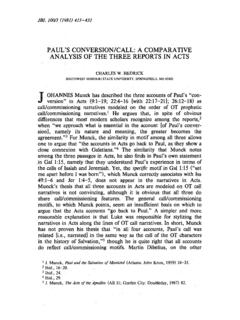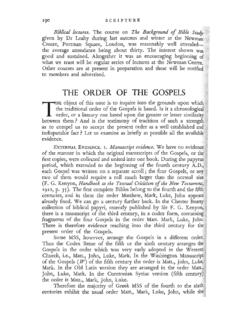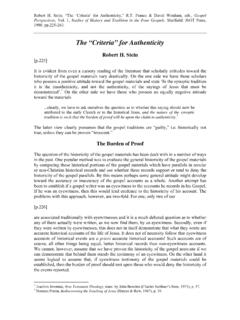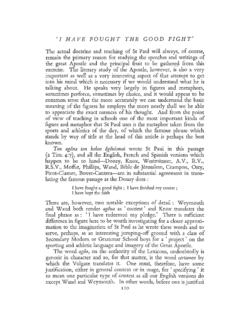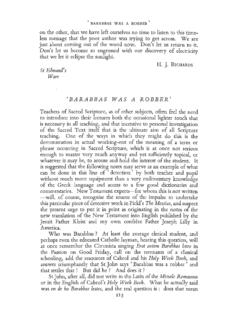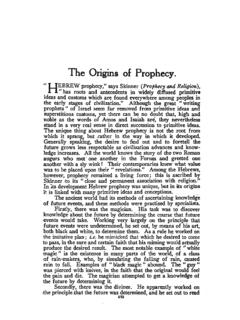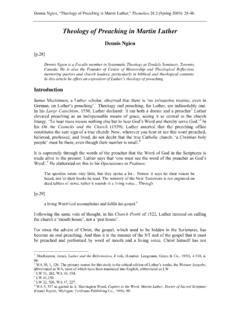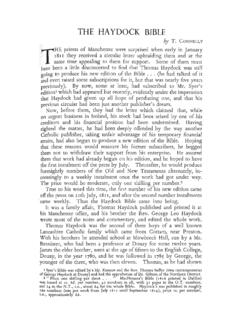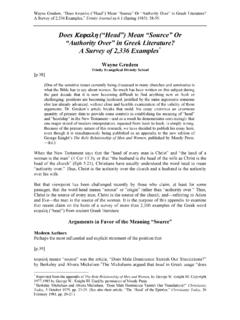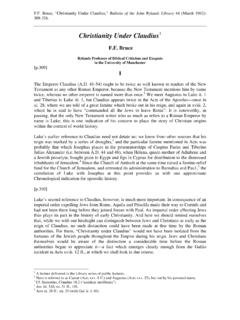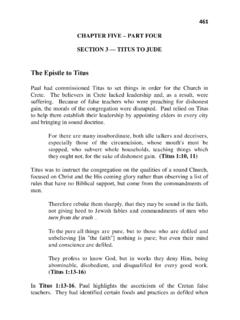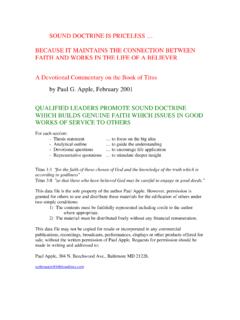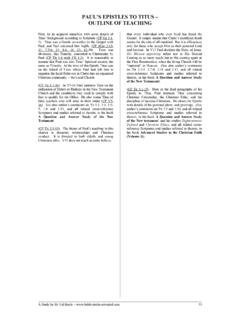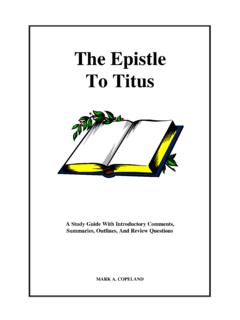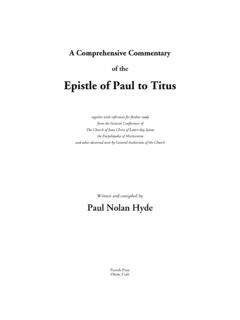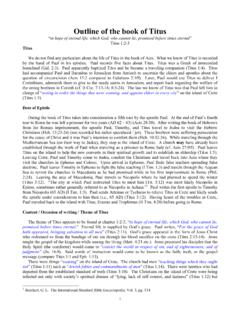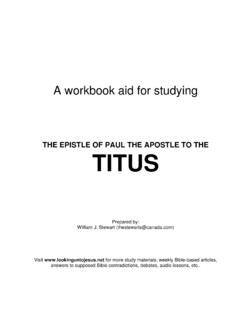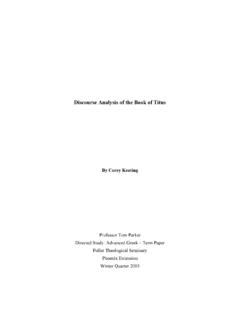Transcription of THE EPISTLE TO TITUS. V.-DuTIEs oF THE HousEHOLD. …
1 283 THE EPISTLE TO titus . oF THE household . chapter ii. 1-10. THE errors which prevailed in Crete, although they rested upon a basis of theory, were in the main errors of conduct. They required to be met not merely by preaching correct doctrine, but likewise by the enforcement of Christian duty. It is rarely sufficient for the teacher to expatiate upon the lofty doctrines of revelation alone, trusting that their ap-propriate lessons for daily life will follow, by mere force of inference, or spontaneously, under a law of spiritual growth. For, although it is true that to preach the " grace of God that bringeth salvation " is the best way of schooling men into sobriety, justice, and piety, yet the careful pastor will find it needful to indicate and urge the practical conse-quences of his teaching as well-rebuking and exhorting with all authority the souls entrusted to his care.
2 It is, indeed, a rare point of wisdom when the pulpit knows how to set forth these two, grace and duty, in their just proportions and in their vital relationship to one another. The extreme of a lifeless morality, divorced from the warm gospel of God's grace on the one side, and on the other the extreme of a barren evangelism, puffing men into a shew of pie!y without real goodness, are equally to be avoided. Equally have they wrought serious mischief in the past experience of the Church. This task of enforcing Christian duty becomes, of course, much more delicate when the teacher attempts, like St. Paul, to descend into details. There is, indeed, one uniform type of character which is appropriate for all Christians.
3 Like a broad substructure, the cardinal virtues of sobriety, righteousness, and godliness, are to underlie every social re-lationship. Yet it is not sufficient for the healthy progress of a Christian community that its members be admonished 284 THE EPISTLE TO titus . in identical terms to practise these universal graces. This ground type of a good character has to undergo, it is obvious, specific modifications according to age, sex, and the social position of the individual. For Christianity respects, and consecrates, the natural ties both of the home and of the commonwealth. It possesses no such anarchic tendency as Paul detected in the pernicious views of the Cretan Jews.
4 Far from upsetting, it sanctifies those seemly and whole-some relationships which it finds established among men ; relationships upon the due maintenance of which the well-being of society must always It is called upon, therefore, to shew how its general principles of virtue will apply to the several relations of rich and poor, of ruler and ruled, of master and servant, of old and young, of parent and child, of husband and wife. Nor can the overseer and .guide of a Christian society claim to have exhausted his functions, until, after apostolic models, he has done his best to develop in each class that character which belongs to it, that both the Christian state and the Christian household may be strengthened and adorned with every virtue which becomes "sound doctrine.
5 " These remarks are suggested by the section of this Apostolic Letter to, the opening of which we are come. It follows up the polemic in the opening chapter by instructing titus , how, in counteracting the errorists of Crete, he was to press upon every class of Christians, in detail, those prac-tical virtues which have their roots in the doctrines of the Gospel. The section is marked as important by its length as well as by its central position ; for it fills the whole of the second, with eleven verses of the third chapter . It breaks easily into two paragraphs, of which the former, occupying chapter ii., deals with the family, and the latter, in chapter iii.
6 1-11, with civil and social life. What is carefully to be noted, as significant of the Writer's strong conviction on the internal connexion betwixt homely duty duties OF THE household . 285 and gospel doctrine, is that each of these two paragraphs contains a splendid appeall to the grace of God in Jesus Christ, and the gratuitous benefits which have been poured forth upon sinners by the advent of our Saviour. The spontaneous love of the Father, the ransoming self-sacrifice of Jesus, the regeneration of the soul by the Holy Ghost, our justification by free grace, our filial standing, and the blessed hope of our Lord's appearing :-all these ar~ among the most mysterious and abstract doctrines of the evan-gelical faith ; yet from these are fetched the motives which are to make old men sober and young women chaste, to teach fidelity to the slave and loyalty to the citizen!
7 Before proceeding to notice the particular duties . of home life in detail, the reader will not fail to remark once more the frequent occurrence of a single epithet which may almost be said to characterize Christian behaviour, as St. Paul, in his later days, came to conceive of it. The repetition of the word I mean is veiled from readers of the Author-ised Version by variations in the rendering of it. In one form or another it really occurs in these verses four times. First, old men are to be "temperate " : that is its first oc-currence. Then, elderly fems,les are to teach the young wives to be "sober," another use of the same word. Next, the younger women are to be" discreet," the same word.
8 Finally, it is the solitary requirement for young men that they be "sober-minded," where once more the same word is retained. What is this moral quality which Paul felt it to be so necessary to enforce upon every age and on both sexes? It denotes (as was before explained in an earlier paper) that moral health which results from a complete mastery over the passions and desires, "so that," in Arch-bishop Trench's words, "they receive no further allowance than that which the law and the right reason admit and approve." Self-control would probably come as near the 1 See ii. 11-14 and ill. 4-7. 286 THE EPISTLE TO titus . idea as any single word we can employ.
9 But it includes such moral sanity or wisdom of character as is o~ly to be attained through the habitual control of the reason over loose, illicit, or excessive desires of every kind. It is by no means to be wondered at that St. Paul should have laid much emphasis on this virtue. Heathen society in its later periods was remarkable for the weakening of self-control. Self-indulgence became at once its danger and its disgrace. When religion came to be thoroughly divorced from ethics, no curb remained strong enough to restrain the bulk of men either from angry passion or from sensual gratification. Multitudes cast off every curb, religious reverence, fear for consequences, public opinion, domestic authority, even self-respect; and a laxity of manners set in, in conversation, in dress, in deportment, in the intercourse of the sexes, and in the enjoyment of every whimsical or extravagant invention which could stimulate the jaded capacity for.
10 Enjoyment, such as almost passes belief. Against this tendency of the later classical period, philo-sophers and moralists were never weary of inveighing. The very word which St. Paul here uses was with them the technical name for a cardinal virtue, the praises of which, as "the fairest of the gifts of the gods" they were always sounding. But the foolish excess which heathen religion had failed to check, defied heathen philosophy too. The time had come for Christianity to try its hand. The task was a hard one. I have no doubt Paul beheld with anxiety the growing inroads which, before his death, the loose and reckless habits of his age had begun to make even upon those little sheltered companies that had sought a new refuge beneath the Cross.
